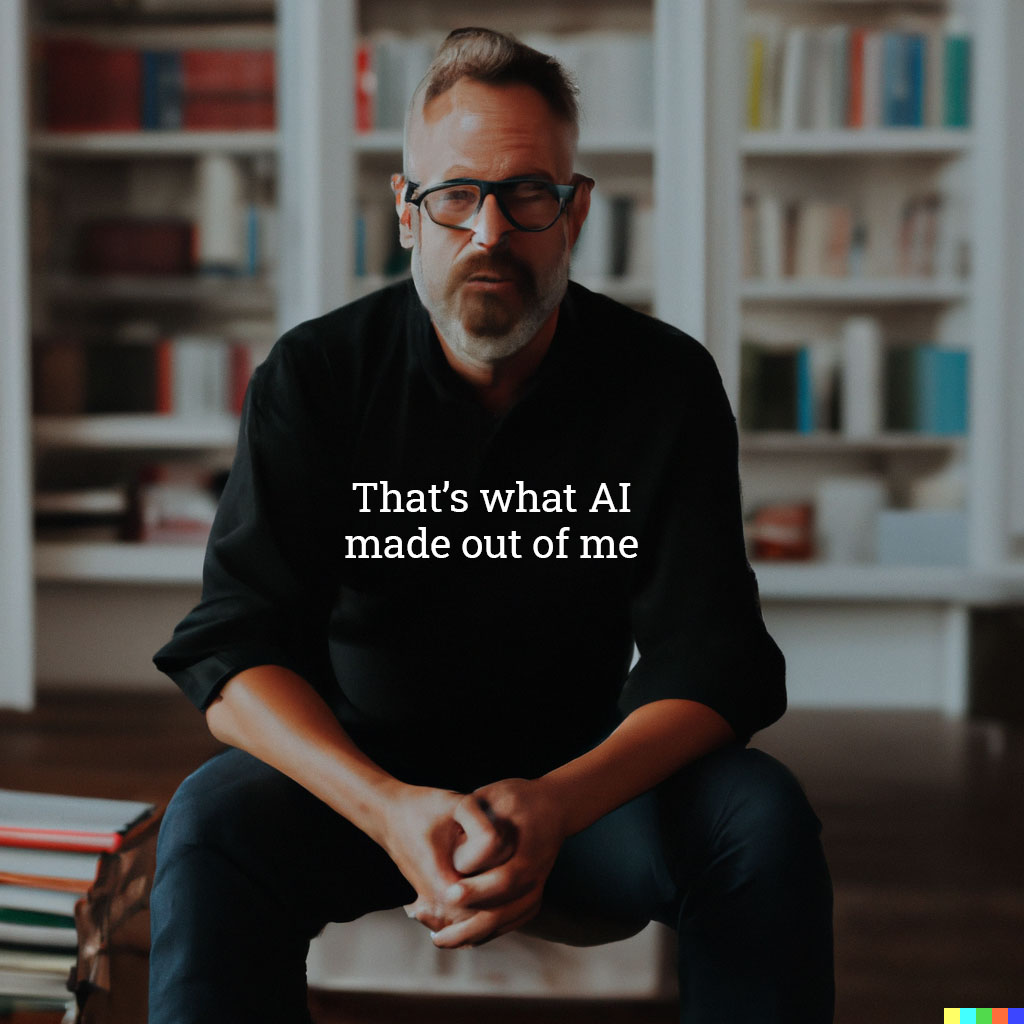Navigating AI: The Impact on Society, Culture, and Ethics
Insights, Perspectives, and the Quest for Understanding whether we will be doomed or redeemed!?
Let’s embark on a journey through the vast and intricate AI landscape. It’s my personal AI trek guided by the impact on society, culture, and ethics, not just technological intricacies. I’ve used numerous resources in my journey. Recently, it seems everyone has quickly become an AI expert.
Just yesterday, we were perplexed by this futuristic technology. Now, it’s a common dinner topic. Isn’t the sudden spread of expertise interesting?
Over the last twelve years, the potential impact of AI to shape society and culture has held my attention. This has been especially true since the foundation of SHIFTSCHOOL in 2015. Amidst the AI frenzy, my post’s intention is to cut through the hype. I aim to shed light on recent developments.
Exploring the Impact of AI on Society and Culture: Beyond Technological Intricacies
AI’s technical advancements are remarkable. However, I’m more interested in how AI influences our lives and relationships. I want to understand how it affects the fabric of our human experience. To grasp AI’s implications, it’s crucial to look beyond the algorithms. We must delve into societal, ethical, and cultural dimensions of AI’s progress.
Key to understanding AI’s landscape are issues related to algorithmic predictions. We outsource more and more critical decisions about people to machine learning systems. These algorithms analyze massive amounts of personal data. This shift in decision-making poses challenges for our privacy and anti-discrimination laws.
Leading scholars have identified several distinct problems. One of these is the potential for algorithmic predictions to reinforce past biases, known as the fossilization problem. There’s also the unfalsifiability problem, the challenge of verifying future predictions. The preemptive intervention problem is when interventions based on predictions prevent verifying their accuracy. Lastly, there’s the risk of predictions actively shaping the future, thereby becoming self-fulfilling prophecies.
Insights offer a fresh perspective on AI’s role in society. Privacy laws need to evolve to address new realities. Currently, they struggle to distinguish between past, present, and future inferences. There’s also an issue with the inherent uncertainty in algorithmic predictions. These challenges reminded me that we must advocate for specific legal and ethical frameworks.
From AI Winters to Summers: Tracing the Highs and Lows of AI’s History
To make sense of the noise, we must explore AI’s history. It’s crucial to understand the mindsets of those who drive recent AI progress. There were infamous AI winters when funding and interest hibernated. Despite this, they emerged stronger and wiser. These periods taught us resilience and determination to push AI forward.
Each winter was followed by an AI summer. This was a time of extraordinary breakthroughs. The advent of deep learning, neural networks, and colossal datasets sparked progress. Suddenly, AI systems surpassed human capabilities in speech recognition, image classification, and chess. These seasons of awe were often followed by a sobering return to reality.
So why should we form an opinion about AI’s impact this time?
The possibility of Artificial General Intelligence (AGI) looms. In other words, amidst the excitement, we stand at the precipice of a monumental shift. In the realm of positivity, AGI holds vast potential.Furthermore, it could revolutionize medical, energy management, and transportation fields.
Imagine a world where personalized medicine saves lives. Plus, renewable energy powers our planet. Traffic jams become a thing of the past. The possibilities are as boundless as our imagination.
Yet, there are cautionary voices amidst this promise. Risks of unintended consequences and misused AGI loom ominously. Privacy concerns, job displacement, and equitable distribution of benefits demand attention. It’s our responsibility to ensure AGI aligns with human values and safeguards collective well-being.
Artificial General Intelligence (AGI): Balancing Potential and Risks for a Better Future
Many see AGI as the pinnacle of AI achievement. It may or may not revolutionize our lives. However, it poses complex questions that need our attention now. We need to think ahead because it may be too late afterwards.
As we navigate the AI landscape, I invite you to explore broader questions. How does AI impact our jobs and industries? What are the ethical considerations surrounding its use? How does it shape our perceptions, values, and interactions? Examining sociological and cultural aspects can help us understand the complex web that AI weaves.
Throughout my journey, I have encountered diverse perspectives. I’ve engaged in thought-provoking conversations. I’ve absorbed insights from experts who study AI and society intersection. It’s clear that AI is not just a technological tool. It’s a cultural phenomenon that intersects with privacy, bias, power dynamics, and human intelligence issues.
The Cultural Phenomenon of AI: Examining the Broader Questions and Impact on Society
These intersections present opportunities and challenges that need careful consideration. In a world where technology permeates life, it’s vital to approach the AI landscape critically.Consequently, we must question not only AI’s capabilities but also potential consequences, biases, and ethical frameworks underpinning its development.
By focusing on AI’s broader impact, we can engage in a wider conversation. We can consider diverse perspectives, experiences, and values that shape society. Moreover, this inclusive dialogue empowers us to shape AI’s trajectory and ensure it aligns with shared goals of equity, fairness, and human well-being.
Unleashing Plasticity: Embracing Curiosity and Diverse Perspectives in the AI Landscape
Fellow explorers, let’s gain what we at SHIFTSCHOOL call PLASTICITY. Let’s be curious, ask thought-provoking questions, and actively seek out diverse voices and perspectives. Even if it hurts, let’s change our opinions along the way. This can help us understand the complex interplay between AI and society. It can equip us to navigate challenges and opportunities that lie ahead.
In conclusion, a robust understanding of the impact of AI in society as well as its ethical implications is crucial as we navigate its landscape. AI isn’t merely a technological tool. It’s a cultural phenomenon tied to privacy, bias, power dynamics, and human intelligence. We can better navigate future challenges and opportunities if recognizing these intersections. I hope you’ll join me in exploring AI’s captivating world. Let’s chart a path that leads to a future where AI serves as a tool for positive change and collective well-being.
Landmarks of my AI journey
Given the rapid pace of artificial intelligence research, staying abreast of new developments can be challenging for both experts and novices. Hence, this post offers a thoughtfully curated ‘AI Canon’—a collection of impactful papers, blogs, courses, and guides for understanding modern AI. It includes an introductory overview of transformer and latent diffusion models—the drivers of today’s AI surge—followed by technical learning resources, hands-on guides for working with large language models, and an evaluation of the AI market.
So, here’s a categorized (and regularly updated) list of resources that I used in order to gain an understanding and make sense about the current state of AI. This list is by no means complete yet sufficient, nor does it reflect my personal opinions on the matter. It just documents my journey (and intent) to cut through the info mess on AI out there. Make up your own mind, jump into the rabbit hole and find out yourself – Doomed or redeemed – you decide!? cto
Learning about AI: Understanding what AI is, how to use it and how to keep track on its development
- Artificial Intelligence Collection – University of Helsinki: This is a collection of courses on various aspects of AI from the University of Helsinki.
- Elements of AI: A series of free online courses created by Reaktor and the University of Helsinki to demystify AI.
- What Is ChatGPT Doing … and Why Does It Work?: An article by Stephen Wolfram examining the workings of OpenAI’s ChatGPT.
- Overview about LLMs: A Github repository providing an overview of Language Models.
- There’s An AI For That: A daily updated list about current AI features.
- How should AI systems behave, and who should decide?: An OpenAI blog post discussing the behavior of AI systems and the decision-making process behind them.
- The AI Revolution: The Road to Superintelligence: The two seminal Wait But Why articles (part 1 and 2) that provide a comprehensive overview of the development of AI and its potential future trajectory (despite being 8 years old, still the best non-tech explanation out there)
- AI Index Report: A report tracking, collating, and visualizing data related to AI to provide unbiased and globally sourced data for policymakers, researchers, journalists, and the general public.
- AI Tidbits: A weekly newsletter offering concise updates on the latest generative AI progress, designed to keep you informed in less than 2 minutes.
- Andreesen Horowitz’s AI Canon: A comprehensive resource for those who wish to dive deeper into the technical and business aspects of the swiftly advancing AI field, featuring pivotal technologies and practical guides for large language models.
Enthusiastic about AI: Voices arguing for the positive impacts of a high-speed (open) development:
- The inside story of how ChatGPT was built from the people who made it: An MIT Technology Review article providing insights into the development of ChatGPT.
- Ray Kurzweil’s resources, YouTube Interview, and Book: The Singularity is Near: Ray Kurzweil, a futurist and proponent of AI, discusses the concept of singularity – a future period during which the pace of technological change will be so rapid, its impact so deep, that human life will be irreversibly transformed.
- Yann LeCun and Andrew Ng: Why the 6-month AI Pause is a Bad Idea: A discussion between AI researchers Yann LeCun and Andrew Ng about the potential negative impacts of halting AI development.
- How to approach the second machine age: An MIT Sloan article discussing how to navigate the challenges and opportunities presented by AI and automation.
- Don’t Fear the Terminator: An article by Anthony Zador and Yann LeCun debunking the notion that AI will develop a desire for dominance.
- Sam Altman: OpenAI CEO on GPT-4, ChatGPT, and the Future of AI: A talk by Sam Altman, CEO of OpenAI, discussing the future of AI development.
- Why AI Will Save the World by investor Marc Andreessen: A compelling yet subjective perspective on how AI can help resolve global issues, revealing the transformative potential of this technology through an investor’s lens.
Concerned about AI: Skeptical voices arguing that the negative impacts aren’t sufficiently considered
- The A.I. Dilemma – Tristan Harris & Aza Raskin – Center for Humane Technology: A discussion about the ethical and societal implications of AI technologies.
- AI and the future of humanity | Yuval Noah Harari at the Frontiers Forum: A lecture given by Yuval Noah Harari, author and historian, on the implications of AI on the future of humanity.
- Watch: AI ‘godfather’ Geoffrey Hinton tells the BBC of AI dangers as he quits Google: A news piece featuring AI pioneer Geoffrey Hinton discussing potential dangers of AI.
- Systemic Reset: AI Technology Governance: An article by Anja Kaspersen & Wendell Wallach discussing how to ensure that AI technologies are used for the common good.
- Leaked Internal Google Document Claims Open Source AI Will Outcompete Google and OpenAI: An article discussing a leaked Google document suggesting that open-source AI might outperform Google and OpenAI.
- Max Tegmark: The Case for Halting AI Development: A talk by Max Tegmark, a physicist and AI researcher, arguing for a pause in AI development.
- Eliezer Yudkowsky: Dangers of AI and the End of Human Civilization: A talk by Eliezer Yudkowsky, an AI safety researcher, discussing the potential risks posed by advanced AI.
- The Geopolitics Of AI Chips Will Define The Future Of AI by Rob Toews: A Forbes article discussing the geopolitical implications of AI chip production and its impact on the future of AI.
- The Prediction Society: Algorithms and the Problems of Forecasting the Future: In this work, the authors discuss the growing use of algorithmic predictions in decision-making and its implications for privacy and anti-discrimination laws. These predictions, based on machine learning algorithms, analyze vast amounts of personal data and can significantly influence personal and societal outcomes.
- Future of Life Institute: An organization aiming to ensure that advanced technologies, including AI, are beneficial to humanity.
- An Open Letter Calling for a Moratorium on “Giant” AI Experiments: This is an open letter published by the Future of Life Institute, signed by numerous AI researchers and ethicists. It calls for a temporary halt to large-scale AI experiments due to potential safety and ethical concerns. This source would be categorized under “Skeptical / Concerned about AI”.
Groundbreaking books to understand the impact of AI and the motivations to push it even further
- Superintelligence: Paths, Dangers, Strategies by Nick Bostrom: A book by philosopher Nick Bostrom exploring the idea of superintelligent AI and its implications for humanity.
- Life 3.0: Being Human in the Age of Artificial Intelligence by Max Tegmark: A book by Max Tegmark exploring the future of AI and its impact on society.
- The Singularity is Near: When Humans Transcend Biology by Ray Kurzweil: A book by Ray Kurzweil discussing the future of human life with the advent of AI and other technologies (his updated version “The Singularity is Nearer” is supposed to come out next year).
- The Second Machine Age: Work, Progress, and Prosperity in a Time of Brilliant Technologies by Erik Brynjolfsson and Andrew McAfee: This book explores the impact of “digital” progress on our economy and society, arguing that the full implications of the digital age are yet to be realized.
A self-selected, and incomplete list of AI researchers that I learned from:
- Kate Crawford: Kate Crawford is a prominent scholar and researcher in the field of AI ethics. She explores the social and political implications of artificial intelligence, data ethics, and the impact of AI on society.
- Erik Brynjolfsson: The personal website of Erik Brynjolfsson, a researcher studying productivity, employment, and inequality in the era of digital technologies.
- Cynthia Breazeal: Cynthia Breazeal is a pioneer in social robotics and human-robot interaction. Her work focuses on developing and studying personal robots that can engage and interact with humans in socially intelligent ways.
- Nick Bostrom: The personal website of Nick Bostrom, a philosopher known for his work on existential risk, the anthropic principle, human enhancement ethics, superintelligence risks, and the reversal test.
- Rana el Kaliouby: Rana el Kaliouby is a leading figure in affective computing and emotion AI. Her research focuses on developing technology that can understand and interpret human emotions through facial expression recognition and other means.
- Yann LeCun: Yann LeCun is a French computer scientist primarily known for his work on machine learning, mobile robotics, and computational neuroscience. He is the Silver Professor of the Courant Institute of Mathematical Sciences at New York University, and Vice President, Chief AI Scientist at Facebook.
- Andrew Ng: Andrew Ng is a Chinese English computer scientist, entrepreneur, and venture capitalist. He is one of the most influential minds in Artificial Intelligence and Deep Learning. Ng co-founded and led Google Brain and was a former VP & Chief Scientist at Baidu.
- Anca Dragan: Anca Dragan is an influential researcher in human-robot interaction and autonomous systems. She explores how robots can understand human intentions, make decisions collaboratively, and ensure safety in human-robot interactions.
- Geoffrey Hinton: Geoffrey Hinton is an English Canadian cognitive psychologist and computer scientist, most noted for his work on artificial neural networks. He divides his time working for Google (Google Brain) and the University of Toronto.
- Demis Hassabis: Demis Hassabis is a British artificial intelligence researcher, neuroscientist, video game designer, entrepreneur, and world-class games player. He is the co-founder and CEO of DeepMind (acquired by Google).
- Eliezer Yudkowsky: Eliezer Yudkowsky is an American AI researcher known for his work in AI alignment and decision theory. He is a co-founder and research fellow at the Machine Intelligence Research Institute (MIRI).
- Fei-Fei Li: Fei-Fei Li is a Chinese-born American computer scientist known for her work in machine learning and cognitive neuroscience. She is a professor at Stanford University and co-director of the Stanford Institute for Human-Centered Artificial Intelligence.
- Yoshua Bengio: Yoshua Bengio is a Canadian computer scientist known for his work in artificial neural networks and deep learning. He is a professor at the Department of Computer Science and Operations Research at the Université de Montréal and scientific director of the Montreal Institute for Learning Algorithms (MILA).
- Andrej Karpathy: Andrej Karpathy is the Director of AI at Tesla. He has made significant contributions to the field of deep learning and computer vision.
- Ian Goodfellow: Ian Goodfellow is a researcher at Apple. He’s known for his work on generative adversarial networks (GANs).
- Jeremy Howard: Jeremy Howard is a data scientist, researcher, developer, and educator. He’s the co-founder of fast.ai, a research institute dedicated to making deep learning more accessible.
- Ruslan Salakhutdinov: Ruslan Salakhutdinov is a professor of Machine Learning at Carnegie Mellon University and director of AI research at Apple. His research interests include deep learning, machine learning, and large-scale optimization.
- Alex Smola: Alex Smola is a machine learning researcher with Amazon Web Services. His research interests span a range of topics in machine learning.
- Daphne Koller: Daphne Koller is a professor of Computer Science at Stanford University and a MacArthur Fellowship recipient. She is one of the founders of Coursera, a platform for massive open online courses (MOOCs), and Insitro, a drug discovery startup.
- Stuart Russell: Stuart Russell is a British computer scientist, noted for his contributions to artificial intelligence. He is a Professor of Computer Science at the University of California, Berkeley and co-author of the standard textbook “Artificial Intelligence: A Modern Approach” used in more than 1,400 universities worldwide.
- Mustafa Suleyman: While not a personal website, this is the Twitter profile of Mustafa Suleyman. He is a British entrepreneur and activist. He co-founded DeepMind Technologies, a leading artificial intelligence company. Currently, he is the Vice President of Artificial Intelligence Policy at Google.
Let’s make sense of AI in order to shape the impact on society and our future
The recent AI discussion has sparked considerable debate surrounding its impact on society. Proponents argue that AI technology has the potential to revolutionize various industries, enhance efficiency, and improve the quality of life for individuals. They highlight its ability to automate repetitive tasks, accelerate scientific discoveries, and assist in healthcare diagnostics.
However, concerns have been raised about the potential drawbacks of AI as well. Critics express worries about job displacement, data privacy, and ethical implications. They emphasize the need for robust regulations and safeguards to ensure responsible AI development. The ongoing dialogue acknowledges both the positive and negative consequences of AI, emphasizing the importance of carefully navigating its integration into society to harness its potential while minimizing adverse effects.
In conclusion, by addressing the concerns raised and fostering a collaborative approach among policymakers, researchers, and industry leaders, we can shape the future of AI in a way that maximizes its benefits for society while mitigating potential risks. Striking the right balance between innovation and responsibility is crucial as we navigate the uncharted territory of AI, ensuring that it becomes a force for positive change in our rapidly evolving world. That AI is going to have a large impact is inevitable, we creators of this technology choose what kind of society we want to build with it.
Find more Wisdom of the Kraut here.









